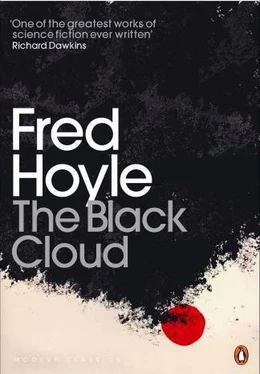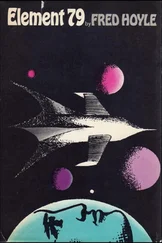Fred Hoyle - The Black Cloud
Здесь есть возможность читать онлайн «Fred Hoyle - The Black Cloud» весь текст электронной книги совершенно бесплатно (целиком полную версию без сокращений). В некоторых случаях можно слушать аудио, скачать через торрент в формате fb2 и присутствует краткое содержание. Жанр: Фантастика и фэнтези, на английском языке. Описание произведения, (предисловие) а так же отзывы посетителей доступны на портале библиотеки ЛибКат.
- Название:The Black Cloud
- Автор:
- Жанр:
- Год:неизвестен
- ISBN:нет данных
- Рейтинг книги:5 / 5. Голосов: 1
-
Избранное:Добавить в избранное
- Отзывы:
-
Ваша оценка:
- 100
- 1
- 2
- 3
- 4
- 5
The Black Cloud: краткое содержание, описание и аннотация
Предлагаем к чтению аннотацию, описание, краткое содержание или предисловие (зависит от того, что написал сам автор книги «The Black Cloud»). Если вы не нашли необходимую информацию о книге — напишите в комментариях, мы постараемся отыскать её.
The Black Cloud — читать онлайн бесплатно полную книгу (весь текст) целиком
Ниже представлен текст книги, разбитый по страницам. Система сохранения места последней прочитанной страницы, позволяет с удобством читать онлайн бесплатно книгу «The Black Cloud», без необходимости каждый раз заново искать на чём Вы остановились. Поставьте закладку, и сможете в любой момент перейти на страницу, на которой закончили чтение.
Интервал:
Закладка:
Kingsley settled himself comfortably in an armchair.
“Of course you know that, instead of transmitting radio waves continuously, as is usually done, it’s possible to transmit in bursts, in pulses. Let’s suppose that we can transmit three sorts of pulses: a short pulse, a medium pulse, and a long pulse. In practice the long pulse might last for perhaps twice the duration of the short pulse, and the medium pulse might be one and a half times as long. With a transmitter working in the range seven to ten metres — the usual range for long-distance work — and with the usual band width, it should be possible to transmit about ten thousand pulses per second. The three sorts of pulses could be arranged in any assigned order — ten thousand of ’em per second. Now suppose we use the medium pulses for indicating the ends of letters, words, and sentences. One medium pulse indicates the end of a letter, two medium pulses following each other indicate the end of a word, and three following each other indicate the end of a sentence. This leaves the long and the short pulses for transmitting letters. Suppose, for instance, we elect to use the Morse code. Then at an average, about three pulses are needed per letter. Reckoning on an average of five letters to a word, this means that about fifteen of the long and short pulses are required per word. Or, if we include the medium pulses for marking the letters, about twenty pulses are required per word. So at a rate of ten thousand pulses per second this gives a transmission rate of about five hundred words per second, compared with a normal transmitter which handles less than three words per second. So we should be at least a hundred times faster.”
“Five hundred words per second. My God, what a gabble!”
“Actually we will probably broaden our band width so that we can send upwards of a million pulses per second. We reckon that a hundred thousand words a second might be possible. The limitation lies in the compression and expansion of messages. Obviously no one can talk at a hundred thousand words per second, not even the politicians, thank goodness. So messages will have to be recorded on magnetic tape. The tape will then be scanned electronically at high speed. But there’s a limit to the speed of the scanning, at any rate with our present equipment.”
“Isn’t there one big snag in all this? What’s to stop the various Governments throughout the world from building the same sort of equipment?”
“Stupidity and inertia. As usual, nothing will be done until the crisis is on us. My one fear is that the politicians will be so lethargic that they won’t get single transmitters and receivers built, let alone whole batteries of stuff. We’re pushing ’em as hard as we can. For one thing they want information from us, and we’ve refused to provide this except by radio link. Another thing is that the whole ionosphere may get altered so that shorter wave-lengths have to be used. We’re preparing here to go as short as one centimetre. This is a point that we’re constantly warning ’em about, but they’re devilishly slow, slow in action and slow in wit.”
“Who here, by the way, is doing all this?”
“The radio astronomers. You probably know that a whole crowd came in from Manchester, Cambridge, and Sydney. There were more than enough for doing the radio astronomy so that they were jumping on each others’ heels. That was until they locked us in. Everybody got mad, the silly asses — as if it wasn’t obvious we should be locked up. Then I pointed out, with my usual tact, that anger wouldn’t help us, that the obvious thing to do was to lick the pants off the politicians by converting some of our radio astronomy stuff into communication equipment. It was, of course, discovered that we had far more electronic equipment than was necessary for radio astronomy purposes, So we soon had a veritable army of communication engineers at work. Already we could swamp the B.B.C. in the amount of information we could transmit, if we were so minded.”
“You know, Kingsley, I’m still bemused by this pulse business. It still seems to me incredible that our broadcasting system should go on pumping out two or three words a second, when they might be sending five hundred.”
“That’s a very easy one, Geoff. The human mouth transmits information at some two words per second. The human ear can only receive information at rates less than about three words per second. The great brains that control our destinies therefore design their electronic equipment to comply with these limitations even though electronically no such limitation exists. Don’t I keep telling everyone that our whole social system is archaic, with the real knowledge at the bottom and a whole crowd of hobbledehoys at the top?”
“Which makes a very fine exit line,” laughed Marlowe, “Speaking for myself, I’ve got a feeling that you’re in danger of oversimplifying things just a tiny bit!”
The Cloud Approaches
The Cloud was not visible during the following summer since it lay in the daytime sky, although it was keenly examined with the radio telescope at Nortonstowe.
The situation was better than the Prime Minister had expected. News from Nortonstowe suggested that the coming of the Cloud was not likely to lead to an impossible fuel crisis, for which he was heartily thankful. For the time being there was no fear of public alarm. With the exception of the Astronomer Royal, in whom he reposed great confidence, the threat from the scientists, particularly from Kingsley, had been safely canalized at Nortonstowe. True, ridiculous concessions had been made. Worst of all he had lost Parkinson. It had been necessary to send Parkinson to Nortonstowe to make sure that no hanky-panky was going on there. But apparently the reports he was receiving were quite above board, and for this reason the Prime Minister resolved to let sleeping dogs lie, in spite of urgent suggestions to the contrary by some of his Ministers. Occasionally the Prime Minister wavered in this decision, for he found it intensely difficult to swallow the frequent messages from Kingsley advising him to secrecy.
In point of fact Kingsley’s innuendos were shrewdly conceived, for Government security was not good. At each level of the political hierarchy, individuals regarded it as safe to impart information to their immediate subordinates. The outcome was that a knowledge of the approach of the Cloud filtered slowly downwards, until by the early autumn it reached almost to the parliamentary level. In short it had almost become available to the Press. But the moment was not quite ripe yet for the Cloud to become headline news.
The autumn was stormy and the skies in England were overcast. So although by October the Cloud had obscured a portion of the constellation of Lepus no alarm was given until November. It came from the clear skies of Arabia. Engineers of a large oil company were drilling in the desert. They noticed the concern with which their men were examining the sky. The Arabs pointed to the Cloud, or rather to a blackness in the sky, which by now was about seven degrees across, looking like a yawning circular pit. They said the pit should not be there, and that it was a sign in the sky. What the sign meant was not clear, but the men were frightened. Certainly none of the engineers remembered any such blackness, but none of them knew the disposition of the stars well enough to be certain. One of them had a star map back at base, however. When the drilling expedition was over he consulted the map. Sure enough, something was wrong. Letters to newspapers in England followed.
The newspapers took no immediate action. But within a week a whole series of similar stories came to hand. As often happens, one report was the signal for a host of others, rather as a single raindrop heralds the outbreak of a storm. The London papers sent special correspondents equipped with cameras and star maps to North Africa. The reporters set out in high spirits, thinking it a wonderful relief to a drab November. They returned in a chastened mood. The black hole in the sky did not encourage frivolity. No photographs were brought back. Newspaper editors had not realized that it is extremely difficult to photograph the stars with an ordinary camera.
Читать дальшеИнтервал:
Закладка:
Похожие книги на «The Black Cloud»
Представляем Вашему вниманию похожие книги на «The Black Cloud» списком для выбора. Мы отобрали схожую по названию и смыслу литературу в надежде предоставить читателям больше вариантов отыскать новые, интересные, ещё непрочитанные произведения.
Обсуждение, отзывы о книге «The Black Cloud» и просто собственные мнения читателей. Оставьте ваши комментарии, напишите, что Вы думаете о произведении, его смысле или главных героях. Укажите что конкретно понравилось, а что нет, и почему Вы так считаете.












